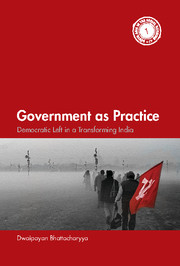Book contents
4 - Machinery: Party Society
Published online by Cambridge University Press: 05 March 2016
Summary
In the last chapter we saw how in the rural public sphere the relationship between the local society and the leadership of the left changed over the years, how the school teachers – who in the early days of the Left Front were the principal agents of popular engagement at the grassroot level – eventually turned into socially distant entities, even ‘enemies’ of the poor and marginal groups. This transformation took place within a larger geography of power, a populated space made of intricate relationship between social classes and institutions in the countryside with its own unique characters evolving through decades of a mutative government as practice. Much of the parliamentary left's ground level politics in rural West Bengal derived its meaning and consistency from the rationale of this networked grid which may be called by the name ‘party society’. Here we trace its roots, follow the genesis of its instrumentality and its eventual crisis before changing hands from the ruling left to its fiercest rivals. Born in the midst of pro-poor promises we explain below how party society metamorphosed into a dangerous outfit for reproducing social marginality and political exclusion.
The idea
Analysing the CPI(M)'s repeated electoral renewals in the light of its rhetoric of ‘development’, Partha Chatterjee had highlighted the mediatory nature of its politics. The left's rural developmental records were not exceptional, nor did it patronize a solid block of electorate as its client on a durable basis. Then how could it retain such a long and unprecedented electoral dominance, especially in the rural areas?
The point is rather that a field of political transactions has been opened which is within the reach of most villagers and where matters of local interest can be negotiated and sorted out on a daytoday basis. It is in that field that the CPI(M), with its permanently mobilized corps of workers, enjoys an advantage in the matter of the daily renewal of the legitimacy of power (Chatterjee, 1997, 160–61).
The ‘field’ got a theoretical expression in what Chatterjee later called ‘political society’ (Chatterjee, 2004). The political society consisted of the poor and the marginal population groups, which constantly strived to protect or enlarge their livelihood needs and entitlements.
- Type
- Chapter
- Information
- Government as PracticeDemocratic Left in a Transforming India, pp. 123 - 154Publisher: Cambridge University PressPrint publication year: 2016



